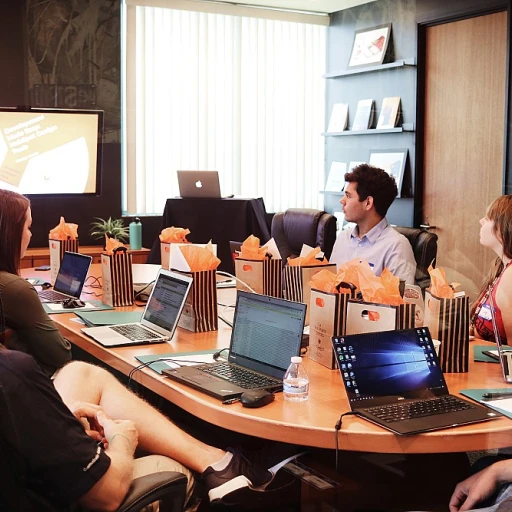
Understanding the Adaptive Mindset
Embracing the Dynamics of an Adaptive Mindset
An adaptive mindset is more than just a valuable asset in today's fast-paced world; it's essential for anyone looking to thrive amidst perpetual change. By fostering adaptability, individuals and businesses can effectively navigate the ever-evolving landscape of work, where traditional methods must give way to innovation and growth. Adaptive thoughts are not static. They require constant emotional intelligence to evaluate and reassess situations as they unfold, making adaptive skills crucial in today's business environment. Critical thinking and problem-solving skills anchor this mindset, allowing one to pivot strategies and goals seamlessly as challenges and opportunities arise. In the workplace, an adaptive mind empowers leaders to inspire their team members to pursue continuous learning and embrace change positively. Cultivating such a mindset can lead to a culture that values growth, resilience, and adaptive leadership – all vital in driving success and retaining competitive edge in the long term. For those aiming to master this versatile approach, exploring the art of improvisation in reskilling is a strategic move (source). It involves nurturing an adaptive mind that remains open to learning, agile in decision-making, and prepared to constructively handle the unforeseen dynamics of change. Ultimately, this mindset is a cornerstone of progressive thinking, serving as a catalyst for both individual and collective advancement in any field.The Role of an Adaptive Mindset in Reskilling
Embracing Uncertainty to Foster Growth
An adaptive mindset is a crucial component when it comes to reskilling in the modern world. As industries evolve and job requirements shift, an individual's ability to learn and adapt becomes invaluable. This mindset is not merely about acquiring new skills but also about developing a mental approach that embraces change and fosters continuous growth.
The role of adaptability in reskilling cannot be overstated. Adaptive skills, such as resilience in the face of challenges and emotional intelligence in handling work-related stress, enable individuals to navigate and thrive in the ever-changing business landscape. Understanding the nuances of adaptive thinking aids in turning challenges into opportunities, ultimately promoting a growth mindset. Mastering the art of improvisation in reskilling is a key to personal and professional growth.
The Business Imperative for Adaptability
For businesses, fostering an adaptive culture is paramount to maintaining a competitive edge. As leaders, cultivating an environment where employees can engage in critical thinking and problem-solving is essential. This does not only enhance the individual’s skill set but also collectively boosts the organization’s adaptability, driving innovation and long-term success.
Adaptive leadership involves nurturing team members’ potential to embrace new challenges and adapt to new work environments. This, in turn, promotes a culture that values continuous learning and agile decision-making. By prioritizing these elements, organizations can better prepare their workforce to tackle unforeseen challenges and leverage emerging opportunities.
Cultivating Emotional Intelligence and Resilience
Central to an adaptive mindset is the development of emotional intelligence, which empowers individuals to manage their emotions and relationships effectively. This skill is fundamental when faced with change, as it enhances problem-solving skills and decision-making processes.
Through targeted training and development programs, individuals can build resilience, allowing them to sustain their adaptive journey even in the face of adversity. In doing so, they contribute to creating an adaptive culture that not only survives but thrives amid uncertainty.
Overcoming Barriers to Adaptability
Addressing the Common Obstacles to Building an Adaptive Mind
In the journey towards embracing an adaptive mindset, individuals often encounter significant barriers. This challenge is not limited to personal hurdles; it extends to systemic issues within organizations. Understanding these barriers is the first step toward fostering a resilient workforce capable of thriving amidst ever-changing demands. Lack of Adaptive Culture An organization's culture plays a crucial role in shaping the adaptability of its members. When a company culture remains rigid, team members may find it challenging to embrace change. Leaders need to champion adaptive thinking and problem-solving skills to cultivate a growth environment. Encouraging continuous learning and adaptive leadership becomes essential in overcoming cultural hindrances. Resistance to Change Change often invokes apprehension and resistance due to uncertainty. This reaction is natural but can be mitigated by fostering emotional intelligence and resilience within teams. Providing emotional support and training that highlights the benefits of adaptive skills and change can empower teams to respond proactively to challenges. Inadequate Training and Resources One primary obstacle in developing an adaptive mindset is the lack of adequate training and resources. Businesses need to prioritize investing in the right kind of learning tools that facilitate adaptive growth. Leaders should focus on innovation-led training programs that align with long term business goals. Check out additional strategies in our exploration of 360-degree learning careers for reskilling here. Fear of Failure The fear of failing can be paralyzing, preventing individuals and teams from taking risks necessary for adaptive growth. Creating a work environment that embraces failures as learning opportunities is crucial. Leaders who encourage a mindset shift towards viewing failures as part of the learning process can help diminish this fear, paving the way for adaptive skills to flourish. In recognizing and addressing these barriers, organizations and individuals can enhance their capacity to adapt, turning challenges into opportunities for growth and success.Practical Steps to Cultivate an Adaptive Mindset
Practical Strategies for Developing Adaptability
In the ever-evolving landscape of work, fostering an adaptive mindset becomes crucial for individuals and businesses alike. An adaptive mind is not just about reacting to change; it’s about thriving amidst it, making use of the continuous learning culture, and viewing challenges as opportunities for growth and innovation.
Building Resilience and Emotional Intelligence
The foundation of adaptability lies in resilience and emotional intelligence. Developing these skills enables individuals to cope effectively with change and uncertainty. Engaging in emotional training or activities that enhance self-awareness and empathy can significantly bolster one's adaptability. This mindset shift empowers not only personal growth but also enriches the work environment.
Encouraging Problem-Solving and Critical Thinking
For those looking to bolster their adaptability, enhancing problem-solving skills is key. Encouraging critical thinking and decision-making leads to better problem-solving abilities. In dynamic work settings, these adaptive skills facilitate successful navigation through complex situations, fostering a culture of adaptive thinking that benefits both leaders and team members.
Adaptive Leadership and Workplace Culture
Adaptive leadership plays a pivotal role in embedding adaptability within the workplace culture. Leaders must lead by example, demonstrating resilience and a willingness to embrace change. Cultivating an adaptive culture involves promoting leadership initiatives that challenge conventional thinking and encourage innovation. This approach not only improves a business's adaptability but also maximizes team members' potential.
Commitment to Continuous Learning
To sustain adaptability in the long term, a commitment to continuous learning is essential. Training programs tailored to enhance adaptive mindsets can support this commitment. Encouraging a growth mindset within the team aids in maintaining an open approach to learning new skills, thus enabling the workforce to remain agile and competitive.













